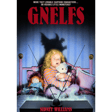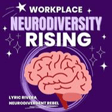Become a Creator today!Start creating today - Share your story with the world!
Start for free
00:00:00
00:00:01

Guest: Horror Author Nickolas Cook
Brought to you by Sometimes Hilarious Horror, Nickolas Cook shares stories from his life with brutal honesty. We talk depression and writer's block, genre faves, Late Night with the Devil, the many shades of sobriety, and why horror has a unique appeal to the traumatized. Plus self-publishing, the noveling process, incels and MAGA and entitlement (oh my!) and more.
Transcript
Introduction to The Mentally Oddcast
00:00:02
Speaker
You are listening to The Mentally Oddcast, brought to you by sometimes hilarious horror magazine. Each week, your host, Wednesdayly Friday, will be talking with creators from many disciplines who live with mental illness, addiction, neurodivergence, and the impact of trauma.
Art from Mental Health Struggles
00:00:21
Speaker
We'll discuss how their mental, physical, and emotional health impacts their creative goals, processes, and the things that they create.
00:00:30
Speaker
We hope we can assure all of you who live with these things that you are not alone and you can make art about it. Art helps.
Introducing Nicholas Cook
00:00:46
Speaker
Hey, this is Wednesday, Lee Friday, and you are listening to the Mentally Oddcast. We are brought to you by sometimes hilarious horror. And this week we have Nicholas Cook. Nicholas Cook lives in, what do we have here? Oh, the Desert Wilderness of Tucson, Arizona.
00:01:05
Speaker
So you have a wife, you have some dogs, and you live among the raptors. Apparently you're surrounded by them, which I love. That's just beautiful. So you believe that birds exist. I know that's not universal these days, so it's nice to know that. Yeah, I don't believe the government has made all the birds.
00:01:28
Speaker
Okay, so you've written a bunch of books. I'm gonna list some of them here. Dead Dog, Bailful Eye, Alice in Zombie Land. I remember seeing the cover for that and I just loved it. The Black Beast of Algernon Wood, and oh, and you have the short story collection, Round Midnight and Other Tales of Lost Souls. We actually were fortunate to get to publish one of your short stories.
00:01:53
Speaker
which, uh, you know, yeah, up there in sometimes hilarious horror, which actually sponsors this podcast. Well, you're, you're the first, first publisher in, uh, 14 years to publish. Yeah. So I appreciate it. Thank you. Thank you. So for people that don't know you, um, let's actually start by having you explain your diagnosis.
Childhood Trauma and Mental Health
00:02:19
Speaker
Well, it started back in, um,
00:02:23
Speaker
back in childhood but what really triggered it was in 2004 I watched a video I don't know if you remember these videos that went online after 9-11 of Americans being beheaded and there was really no censorship back then a lot of the places you could go to would show you the whole video well I accidentally clicked on one and not knowing what it was and I thought well this can't be for real but why would they put this online so people could see this
00:02:53
Speaker
It turns out it was very real and I watched a man being beheaded and it was traumatizing. And what happened was it triggered me from the things that had happened in my childhood and
00:03:12
Speaker
Cause I grew up in a, in a very rural Northeast Florida backwoods swamp family and everybody around us for about five miles was they were all family members. So it was almost like a clan. Wow. And so they had their own rules when it came to basically raising children. And rule number one was you will get your ass beat.
00:03:36
Speaker
for anything if you piss them off. So a lot of times we would, there was some, a lot of violence in my family, you know, guns being drawn, cops would show up every weekend. It was a very dramatic, uh, childhood. Um, but what happened is when I saw that video, it just, it kind of brought me back to that, that feeling of just the dread and the, that thick darkness feeling in your, in your soul, you know, like, yeah, this is terrible. How, you know, how can this happen? Sort of feeling.
00:04:06
Speaker
And then, you know, I did see a psychiatrist for that for a few years and I kind of let it go because I felt like, well, maybe I've dealt with this and I'm okay. I thought I was okay. But in 2009, I was in a middle of a Krav Maga drill and
00:04:24
Speaker
One of my Achilles tendon on my right foot, it snapped. Oh, just completely snapped in half. All right. So, which is a fairly, it's a common thing to happen in extreme sports. I mean, it happens all the time in soccer and sometimes in football and things like that, where you're very, very physical.
Physical Injury and Mental Health Journey
00:04:41
Speaker
And so it would have been a very simple surgery. I went to see a doctor, he diagnosed, he said, here's what we're going to do.
00:04:48
Speaker
And he kept telling me, well, you know, you're never going to walk again the same. You're always going to have a cane. You might be lucky if you never wind up in a walk or a wheelchair. But I was pretty defiant about that. And, uh, it took me a while, but I, I proved them wrong. I was able to walk again. I was after five years, I wasn't using a cane anymore. And I was.
00:05:05
Speaker
able to run and do my workouts and stuff like that. But the problem was that during that process of me having to go through that, I felt so powerless. I was jobless at that point. I couldn't work. I was starting to drink and I mean drink a lot.
00:05:20
Speaker
So that was becoming a problem. And I knew it was a problem because I grew up around people like that. I knew what an alcoholic is. You know, I know that there's different levels. You don't have to be shit faced and falling on the ground to be an alcoholic. You can be very functional and still be a drunk. And that's what I had become. And I stopped writing. I wasn't reading books anymore. I went into a mental spiral that just, it was scary. And I look back on it now and wonder how the hell did I even survive all that?
00:05:48
Speaker
But I went to see another doctor. He put me on, um, cause he knew there was a problem. He knew there was, I was having some problems with depression and I couldn't sleep. I was drinking too much. He's like, let me put you on these antidepressants.
00:06:01
Speaker
So he did put me on some antidepressants. They worked up to the point to where, because of the infections I had, this doctor had talked me into getting a gastric bypass. Oh, wow. Because he kept saying, I was overweight and it's your weight. And I'm like, I'm not that overweight, man. This is pure muscle you're looking at. This is not, I'm not a fat guy. I wasn't a fat guy back then. I was just a very large guy. I was 260 pounds.
00:06:24
Speaker
6-1. I was doing martial arts, wrestling. I was doing boxing. I was doing a lot of heavy stuff. So it was all pretty much muscle. But I felt like I didn't have a choice. I went and had the surgery. But as soon as I had that surgery and I was taking antidepressants, what happened was my metabolism had changed because they shorten your intestine and basically just cut it in half. So everything that comes and goes out of you
00:06:51
Speaker
Has changed now. All the chemical reactions are changed. Everything happens in your head changes. Uh, you know, this is all stuff they never warned me about. So when I was taking these antidepressants, I started getting the nasty side effects. Like, you know, I kept getting more depressed. I got suicidal. Um, I was crying for no reason. My emotions were all over the place. I was having rage episodes and I was just like, I felt like I had no control over myself.
00:07:20
Speaker
So one day I was looking in the mirror and I'm thinking to myself, what am I going to wear when I slit my wrist today? Oh geez. And I looked at myself in the mirror. I was like, who the hell is that? Who is saying something like that? You're not going to kill yourself. And I was like, no, I am going to kill myself today. And that's when I called the doctor and I said, you got to take me off these. We're done. I can't take these anymore.
00:07:43
Speaker
And I told him what had happened. He agreed. He says, yep, you're absolutely right. If you were having suicidal ideation, you need to like stop it right now. Um, let's get you in here tomorrow and let's talk. So I went in and he set me up on pain meds because now my leg was, you know, obviously in pain constantly at this point. Um, we started out with oxycodone, oxycodone, we went to tram at all. We went through all these other, um, nerve blocker things that would help with the pain.
00:08:11
Speaker
And finally, we ended up after two years, he put me on fentanyl.
Addiction and Recovery
00:08:15
Speaker
Oh, wow. Fentanyl back then, it wasn't the bad guy drug. Yeah, people didn't know yet about fentanyl. Yeah, exactly. So he had set me on a pretty conservative dosage in the beginning. And I was taking them anywhere between 24 to 48 hours. I had to put a new patch on. We started out at 100 micrograms, which is, if you're a little kid, it would kill you. Right. But if you're a grown ass adult,
00:08:41
Speaker
you who's active and you're okay with it. But the problem is with any pain meds, any drug, basically, it started losing that effect over a period of time that you're taking it. So every six months, I was having to up the dosage and this doctor was just like, okay, well, let's do that. Nobody knew how bad it was in up to that point. And so after it was almost two years, he had me up to
00:09:06
Speaker
almost 400 micrograms per dose. Now that is enough. That's enough to kill two adults easily. I mean, you see it on the news all the time. Even these teenagers, they don't even take half that amount that kills them. I was doing this every 24 to 48 hours and it was helping me, but it had so many bad side effects to it. Like, you know, it did make me emotional. It was almost like taking antidepressants again, only at least I was getting the benefit of not being in pain constantly.
00:09:37
Speaker
So, uh, we, I finally, at some point, I just told the doctor, I said, I don't think I want to do this anymore. I started seeing the news reports about how bad it was for people and how people were dying from it for dosages that were nowhere near the amount I was taking. So I went back to him and I said, we got to, you got to put me on something else or I got to get off this. He said, son, there ain't nothing else I can put you on. This is it. This is the strongest thing I can do other than give you heroin.
00:10:02
Speaker
So at that point, I said to myself, if I'm if I'm going to live through this, I got to stop. I got to stop taking fentanyl. And that's what I did. Now, it took me a whole year to step down from.
00:10:15
Speaker
that nearly 400 micrograms back down to around 100 or 80 or something like that towards the end. It took me a whole year to step down from that to get down to that amount so I could get off of it. And even then, when I stopped taking it, it took me two weeks to get over the withdrawals. And I tell you, if it hadn't been for bourbon and brandy and vodka, I would have never had made it through that two weeks. I felt like I was going to die. There was no way to express or to explain
00:10:45
Speaker
That feeling inside where you just feel like you're being crushed and everything is just being drained out of you and you're just being sucked into this hole. Like you can't get out of it. That withdrawal feeling is something I'm never ever going to forget in my life. It's probably one of the worst sensations I've ever had. And that's Stephen County in the leg. I'm telling you, the withdrawals is almost as bad as dealing with a leg for all those years. So, you know, and that put me into a really bad mental state.
00:11:13
Speaker
And I had to go back to a psychiatrist and she was, she had been my psychiatrist before, but I had stopped seeing her because I felt like I had been dealing with it. Obviously I had not dealt with it. Uh, I had been suppressing it a lot of shit for my child who was starting to come up again. I was starting to. Yeah. Well, that would have to really like mirror those feelings of like, cause it's a lot of the same thing. It's, it's things that are outside of your control. You know, there's a helplessness factor.
00:11:41
Speaker
there's the sense of feeling trapped and not being able to see a way out of it. Like, I think those things are more familiar to people than talk about it. And if I can just, as long as I've interrupted you here, I would really like to commend your willingness to get mental health treatment because that's, I mean, it's difficult for everybody, but I think that certain cultures
00:12:10
Speaker
make that especially difficult for men to admit that they need help with their mental health. What I grew up in is exactly that. What you described really sounds like... You were a pussy if you had to get help. If you ever cried, you were a pussy. And I'm using that term the way it was used with me. It was that sense of you're letting everybody down because you're being weak.
00:12:37
Speaker
You're letting yourself be weak. You got to be stronger. You got to get past this, just ignore it and get, that was the kind of mentality I grew up in. And that's just code for like, stuffing it down. And that's why, that's why people with that mindset are so likely to turn their anger on each other and, and internally. And then that's when you get into like alcoholism and domestic abuse and you know, it's, it's just this big cycle. And so like, kudos to you.
00:13:04
Speaker
for recognizing the cycle and breaking it, even when your life seemed determined to, to put you back into those patterns. I mean, that, that must have taken, like, I want to ask, like, what kind of support structure did you have, like, outside of the medical community? Like, did you, who is in your life that helped you through this? Well, my wife, uh, my wife and her mom who lived with us at the time, um,
00:13:32
Speaker
They, they tried to take care of me and help me. And basically they were the only financial income we had in the whole house. I couldn't work. So there was that other aspect of you're a grown ass man and you can't even go get a job to help support your family. That's how, you know, it's that kind of thing where I grew up, the man always worked, the man always had a job.
00:13:52
Speaker
You know, it didn't matter what happened. He got hurt. He still had a job, but in my case, nobody would hire me. I had an open wound on my leg. They were going to put me in a office somewhere to work. There was no way I couldn't stand up to do anything else. So that kind of that, that really messed with me mentally. Cause I felt like I was letting them down, but my wife and her mom.
00:14:12
Speaker
Uh, took care of the bills and they tried to take care of me, but I gotta, I gotta say they got the patience of the saints because I was not easy to take care of. I didn't want to be took care of. I was pissed off constantly. I was in pain all the time and I just felt like.
00:14:28
Speaker
Maybe this was your fault. Yeah. Like maybe you did overdo it. Maybe this was your fault. Cause you were too old to be doing this shit. You shouldn't have been in there in that gym doing three hour workouts at a time. It was, it was an insane, uh, cardio routine that we would do. And I would do it six days a week. So I was in really good shape. But when I got injured, I felt like somehow it was my fault. I did something wrong. It was me and I couldn't get rid of that sensation. So I would take it out on everybody else.
00:14:58
Speaker
You know, like you said, you know, you turn on the ones you love because you're suppressing this shit. You're not dealing with it in a healthy way. But when I saw how badly it was affecting my wife, uh, because she was to a point where we were barely talking to each other. The only time we talked was having spring matches or her, you know, getting pissed about how much I was drinking and how active when I was drinking. Cause when I drank, I was a complete asshole. I would get pissed at everything.
00:15:26
Speaker
I would get pissed at a TV commercial. You know what I mean? Like, I would just lose it over the stupidest shit. And I couldn't control it. I would tell myself, don't get angry about this. This is ridiculous. Why would you get fucking pissed about this stupid? But I would still do it. And I couldn't stop myself. So she dealt with that for years. And once I started getting help and I stopped drinking and I felt better about things.
00:15:53
Speaker
But I figured out something and as much help as I did get from the psychiatrist that I have seen, people go into this thinking that this person is going to fix you. No, they're not. They're not going to fix you. You're going to fix yourself. They're going to help you fix it. But you're not, I know a lot of people that have gone to the psychiatrist and say, well, that psychiatrist didn't help me at all. Well, what the hell was this psychiatrist supposed to do? Yeah. You know, were they supposed to get you?
00:16:21
Speaker
Yeah, you got to put the work it's and it is work. It's a lot of work and you got to like, evaluate yourself. And yeah, that's the thing is that it's not a thing that you do. And then you're done doing it. It's a process. Oh, I still I still have days where I have to sit down and talk to myself. You know what I mean? Oh, totally, mental discussion. Totally. You know, this, this isn't healthy. And that's something we talk about a lot around here is that the ways in which using your art,
00:16:51
Speaker
it like helps you through that. But the other thing I wanted to point out though, is that those feelings like that anger and stuff, like when your formative years are full of violence and like threats and that feeling of like always having to watch your back.
Overcoming Fear and Vigilance
00:17:11
Speaker
Exactly. I mean, that sets you up for a lifetime of feeling that way.
00:17:15
Speaker
You know, I always, I still feel that way. I still feel that way all the time. I'm like a wild animal. If I'm in public, I am constantly situational. Whereas, uh, you know, I, I am watching every single person. Cause I think to myself, well, that person could just come over here and attack me for no reason. Cause I grew up in a family, you know, my dad would come home drunk and he would just start beating the shit out of me and my little brother for no reason. Or he would find the dumbest reason and then set on us. I mean, when he beat us, it wasn't with his hands.
00:17:44
Speaker
He used two by fours, belts, a stick once, like a garden, uh, rate stick. He beat the shit out of us. I mean, he got to the point where we were getting injured and people were getting concerned. And my mother, she was pretty much powerless because in that kind of culture.
00:18:02
Speaker
women were not really, they didn't really have a say in anything back then. Cause this was back in the seventies, uh, in Florida. So, and let me say that again in Florida, because you know, all this stuff you see on TV about how bad Florida is and Florida man and all this shit, that's what I grew up in. That is exactly what I grew up in. Those kinds of people.
00:18:25
Speaker
like willfully stupid and proudly to be uneducated. And look down on people who do have an education and get pissed at them. Yeah, yeah.
00:18:34
Speaker
That's huge, man. That's like so much to be dealing with. And it's just masterful how you've managed to not just come out of it, like with your, your sanity and your sobriety intact, but like to go on and right about. So, so the sobriety part now I have drunk drink and stop, drink and stop. Now I've gone through a cycle over the years where I feel like, okay.
00:18:59
Speaker
you're in a healthy place. It's okay to start drinking again, you know, and and I would be in a healthy place. But if something happened, and I was still drinking at the time, that's when it becomes unhealthy. Sure. Because then I would so over drink, and then I would be angry again. Right now, I'm in a place where I feel comfortable drinking.
00:19:22
Speaker
I don't do what I did in the past. I don't get pissed off and punch holes in the wall and screaming to everybody for nothing. Nothing later. If I scream at anything, it's the TV news. Well, the news is pretty fucking infuriating. So no, no problem there. Oh my gosh. Yeah. So in terms of being sober, sober, I I'm sober most of the time, but I do sit down at night and I have some beers and I watch movies or the news or whatever, and I do my writing.
00:19:48
Speaker
And it's a very calm, calm environment. I don't get upset other than the news, but that's it. I don't, I don't sit around and get rage roided and yell at people for coming into the room and shit like that.
00:20:04
Speaker
Well, I'll tell you, man, EMDR is the thing that I recommend to people that have the symptoms that you have. Raised in a violent household, my mom, bipolar, untreated for it, prone to rage. And then I went through a phase where I said, you know, my mom, like when I turned 30, I remembered what my mom was like when she was 30 because I was 10.
00:20:31
Speaker
And I thought, you know, she's, she was mentally unwell. She couldn't control herself. But what I realized was that like, grandpa didn't know that this was happening and didn't know that this was happening. And my T I shouldn't have said her name, but like the teachers didn't like a few teachers suspected, but none of them like knew. And what I realized was that it wasn't that she couldn't control herself. She could control herself just fine when she wanted to.
00:20:59
Speaker
and she didn't care to control herself around us because for whatever reason, I mean, I don't know if they like, if they convince themselves that we deserve it for like, making them angry or whatever. Like, I don't, I won't pretend to know what kind of mental gymnastics abusers use. That's kind of what I felt like with my dad, same thing. Like he blamed us for shit that we didn't have anything to do with, but he felt like he was justified.
00:21:25
Speaker
Because he was pissed and he needed to be so many pissed at. Right. And kids are easy. Yeah. Well, and it's an interesting thing because even people that defend violence against children as discipline, even those people tend to think that by the time a kid is 12 or 13, that that's when they should start using their words with the kid. Right.
00:21:47
Speaker
It's always seemed curious to me that the times that parents want to stop hitting the kid is right around the time that the kid is big enough to do damage if they hit back. It's amazing how the coincidence of that.
00:22:01
Speaker
Yeah, that's exactly what happened. As soon as I was big enough to take my dad on, he laid off. I took a shovel to him once because he was hitting my mom. Wow. I picked up a shovel and I told him, I will kill your ass right fucking now. I don't care what happens to me, but you're not going to touch her again.
00:22:19
Speaker
And, uh, he, he sobered up at that moment. He saw that shovel and he knew I meant business. It must've been something in my face that was not there before, but he, and then he maybe looked at my size. Cause at that point I was, I was pretty big, even for a 13 year old kid, I was big. And so I think he, he realized maybe I can't keep doing what I was doing before. And he did layoff and he eventually he did sober up and he became a better person.
00:22:49
Speaker
to be around, but at that point, I hate to say it, but at that point, the damage had been done. I could not look at him as a safe person anymore. I couldn't trust him. Ever. Yeah. Well, that's understandable. And it's an interesting thing with abusers because there's always that thing where once they've calmed down, no one else is supposed to be upset.
00:23:11
Speaker
Like someone has just beat the ever loving hell out of you. You're still crying, you still hurt, but they're not angry anymore. So you're not allowed to, like my mom would come upon me like days later and say, how did you get that bruise? How did you get that cut on your leg? And I would just, that to me was more terrifying than the actual abuse. Cause I'd be like, does she not remember what happened? Does she not? Yeah. You know, and as a kid, it's just, I mean,
Writer's Block and Recovery
00:23:41
Speaker
You can't even get your head around it. But maybe it's time to get off this topic. Maybe it's time to talk about the writing. Now, I know you mentioned having some writer's block while you were going through depression, which is real common, real, real common. So how did that end for you? How did you get through it?
00:24:03
Speaker
That went on for 13 years, 13 years. And there would be periods in that 13 years I would pick up and try to write. And I would write a few pages and be, oh, this is great. I'm back. But it just never took. And there would always be something that would kind of drag me back down under the hole. And I wouldn't feel like I wanted to write anymore. And at the time, this is after I had published all this stuff. Now, I had already published the books and the short stories. And I was actually starting to get a name for myself in the community.
00:24:32
Speaker
And then I just stopped because I just, I couldn't do it. It was just too hard. I couldn't keep my head around it. I just didn't have the passion for it. But, uh, just in, in 2022, um,
00:24:45
Speaker
We did, I did the, uh, uh, rhymo, no, my, uh, there you go. Exactly. I always screwed that up. Um, so I decided to do it again because I had done it three times prior and I just never got anywhere with it. Uh, I'd started and just never finished anything, but this time around something, something had happened. Uh, we had been homeless for a whole year.
00:25:08
Speaker
We had lost our home during the COVID thing. We couldn't keep up with the payments. We lost our home. We were staying with friends. We even moved to Oklahoma to live with some relatives for a while. But when we came back to Tucson, we had been homeless almost a whole year. And then we got a place, luckily, thank God,
00:25:30
Speaker
Uh, cause it was very difficult to find a house in that, in those years, because there weren't houses to be had and people were getting kicked out left and right. You know, you can see it on the news all the time. It was, it was a very scary time for us because we were like two weeks from being on the street when we found this, this place to live in. And something happened to me during that time. I took stock of all the shit that I did have and not all the things that I didn't have or I had lost.
00:25:56
Speaker
nice and i sat down you know i had a long conversation with myself my inner voice this is this is your chance right here nick this is your chance to get the hell out of this hole and get back to the person that you used to be that you that people loved people trusted you know people cared about you uh and i sort of did
00:26:19
Speaker
And the other thing, I just started cutting people out of my life that were just negative people. I didn't want to hear the bullshit anymore. I didn't want to hear your negative stories. I don't want to hear how bad your life is. You know, don't drag me down with your shit. I'll listen to you. That's fine. I now commiserate with you. I have empathy for it, but don't make me feel like I've got to take your problem on because it's not my problem. You need to deal with your problem. And I became very selfish in that respect, where I just started telling people, including my own parents. I don't want to hear it.
00:26:48
Speaker
I do not want to hear it. If you've got something negative to say, we're going to just end the conversation. And so we did. I cut myself off from all of those people, including my parents. I do not talk to them anymore. I had friends that I used to talk to and they were so fucking negative about everything. It's like, you don't know how good you got it.
00:27:06
Speaker
You got two working legs. You got a place to live. You got money in your pocket. You got a car. Don't tell me this bullshit how bad your life is. Look at what we're having to go through right now. We lost everything. I mean, we lost everything in that in one year. Everything was gone. All we had was us and our dogs. We lost our cars. We lost the house. Our bank account was just basically broke all the time. We were basically barely getting by. We were living in a hotel. And when we got into this place,
00:27:35
Speaker
I really thought, you know, this this is good. This is where you need to be. You need to start learning to be happier about things. Be positive. Do not let darkness drag you down because, you know, certain certain people and you probably agree with me on this. You have a darkness in you. And if you get into it all the time, that's all you're ever going to see. You're always in the hole. You're always thinking about dark shit, how horrible things are. And at some point,
00:28:04
Speaker
You got to stop doing that. It's not like you can ignore it. You're not ignoring it. You're you're accepting it. You're accepting that. OK, yes, this is shitty. But what can you do about it? And where are you at right now versus where you were then? You're not back there, then you're here now. This is where you live now. So be happy in this moment. This is where you are. And that changed everything. It changed everything in my whole life. And it was almost like an overnight thing.
00:28:32
Speaker
Yeah. And you know, even if you can't be happy, you can figure out what it is that would make you happy and set goals. Cause getting things done, like for me, what I am feeling like worthless and hopeless, I look at what I can do, like what is within my power. And then I look to see if there's anyone who needs help because helping people, nothing, nothing in the world makes me feel better than knowing that I have helped someone.
00:29:02
Speaker
So it was a good feeling when you yeah, that's actually that's one of the reasons that I love running a magazine is because I get to look at people's writing and say this is great and more people need to see this and then I feel good and the people feel good and then you get to work out to the people and you know, especially at horror because horror is such a like
00:29:26
Speaker
meaningful genre, especially to people who have lived through some shit and who have seen some shit. You know, horror is like that genre for people that like it's healing, it's cathartic, it's passionate, it's like cautionary. You could do all kinds of socio-political commentary if you want to. Like there's just so much happening there in the genre that is helpful to people.
00:29:53
Speaker
And then when you couple it with this idea that like, I mean, I have to think that you've worked through some of your, your darker impulses in your work. I mean, that's usually where the horror comes from. Did you want to like, give us an example of something in your work that came out of your, your personal struggle? Um, having gone through withdrawals and, and having
00:30:20
Speaker
been basically a functional, well, barely functional, alcoholic back then. Um, once I started writing again, it was almost like I could see that person from a different angle and I could understand him. I knew what made him do what he was doing back then. I had no fucking clue why I was doing what I was doing other than I was just pissed off. But when I was able to start writing again, I could look back on that and find the ways that
00:30:49
Speaker
I wasn't, I wasn't always broken. You know, I could look back and see things that I wasn't always broken. I, there were good things about me too. And those were the aspects that I wanted to get back to. But when I started writing new characters and all my new stuff, there's always, there's always at least one guy that has an issue with drugs or alcohol. And he's got to learn to deal with it, you know, or maybe it just kills the character. It depends on what the story demands, but
00:31:19
Speaker
There's always now somebody that has an issue with addiction. Because I think I understand addiction a way much better than I ever did before. I understand how to get past it now. There's no magic words. Like you said before, it's work. It's work. It's not you wake up one day and you're fine. It is like every single day you gotta wake up and you gotta be affirmative and positive.
00:31:48
Speaker
Try to find something that gets you going. It keeps you going. You know, you got to have the light at the end because, man, that tunnel is fucking dark. Yeah, it is. Yeah. Well, and that's one of the other great things about writing is that it.
00:32:06
Speaker
Like once you have something to say, there's an immediate outlet for it that you could put it in a story with these people
Writing Processes and Inspirations
00:32:13
Speaker
that you invented. Like I'm like you actually, when I'm writing new characters, I'll make character sheets that just talk about like, what do they look like? What do they wear? What kind of car do they have? Like what do they want? What's stopping them from getting what they want? And one of the things on every character sheet is someone's drug of choice. Cause for some people it's, you know, I mean like,
00:32:35
Speaker
You know booze or weed or whatever for some people it's power for some people. It's sex some people are like Insistent that they're not drug addicts, but if they don't have coffee in the morning, they're fucking useless for the whole day Right. So so it's always worth exploring in a character I think because it's it's such an ongoing motivator like I smoke weed I drank a lot in college but like now I'm a weed person because uh
00:33:04
Speaker
And the thing is for a while, it was problematic for me in my life because basically I didn't have enough money to smoke all the weed that I wanted. And the things that I did to get the money to smoke the weed that I wanted got me in trouble in other ways. So when you get in certain kinds of trouble, people in black robes will say, you know what you need to do is sober up and get some treatment for your mental illness. And I'm like, wow, I would love to get some treatment for my mental illness.
00:33:35
Speaker
And that's all. So that was kind of my journey was that I had to figure out my mental illness and then I had to get a handle on my weed smoking knowing the whole time that I had no intention of stopping completely. I never wanted to do that. I never actually told anyone I wanted to do that. Everyone just assumes that complete sobriety should be the goal. Yeah, see that.
00:34:01
Speaker
That's that's the thing. I just just human nature is what we are always trying to change our state. You know, people who are sober, that's wonderful for you. But for the most part, aren't we all trying to like change our state? We never want to stay in the same state of mind. People who drink coffee, people who smoke, people who do drugs, people who drink. These are all efforts to change our state of mind to change our state of being, you know,
00:34:29
Speaker
And it seems to me like no one ever escapes that. I don't care how pure you are. You you will still have some sort of addiction, even if it's a religion, because religion itself is basically an addiction. I mean, faith is not faith is different. Faith is something you have and as personal between you and whatever you believe is out there or not out there or whatever. But religion, religion is is something that pulls you in and it gives you like a structure and you get addicted to that shit because you think
00:34:58
Speaker
Well, this is where I belong. These people love me. There's a God out there who's going to take care of me. And it's all part of the whole addiction thing.
00:35:05
Speaker
No, I'm not to interrupt you. I didn't mean. Oh, no, not at all. It just occurred to me that, you know, nobody actually ever gets away from being addicted to something. Well, I don't know how many AA meetings you've attended, but, uh, my understanding is that there's a lot of chain smoking and, and coffee pounding that goes on at those things. And so I have heard their, their newfound addiction to Jesus. And that is certainly not to denigrate anyone. If you decide.
00:35:31
Speaker
that you want zero alcohol and 100% Jesus in your life and that's what's best for you. I fully support that. I really do. Proselytizing on the other hand, which also seems huge with recovered addicts. Oh my goodness. That's a little more difficult for me to accept. But the thing is though that like,
00:35:52
Speaker
earlier, I was talking about EMDR. That's a specific type of therapy that is for people with PTSD. It helps with anxiety. Basically, people who have been through a war, combat, first responders, and people that grew up in abusive households where you constantly had to watch your back. It's a therapy that helps people
00:36:17
Speaker
reprocess those feelings so that you don't get that visceral response. Like my thing was flinching anytime I was dating this great guy and anytime he would go to put his arm around me, I would flinch or he'd lean in for a kiss and I would flinch.
00:36:31
Speaker
I am like a vegan with that shit. When somebody says anything remote about their own PTSD, I am immediately like, get EMDR. It will change your life. It is better. And I sound like those people that talk about Jesus or CrossFit or whatever, like, Oh, you have to do it. I'm just such a booster for it. Um, and I realized that certainly that doesn't work for everyone. Just like being completely sober doesn't work for everyone. Just like.
00:37:00
Speaker
I do know alcoholics that if they have a drink, they will just straight up start drinking again and there is no control. If that's what people need to do, by all means do it. I'm not here to tell anybody else what they need. Getting back to the writing though, who do you respect and admire in the writing community?
00:37:23
Speaker
Oh, wow. Um, it's a huge list. Um, if we're, are we talking about people who are still alive? Let's let's, let's talk about people who are still alive. Well, let me start with a couple of names. Um, Jeffrey Thomas, incredible writer. So underrated. Um, he really should be a bestseller at this point. Um, his book, the American, uh, wow.
00:37:47
Speaker
Uh, transformative. I mean, when I finished reading that book, uh, he sent me a Cali years ago and I was going to do a review for it, but it fell through, but I read the book and it was incredible. It made me want to be a better writer. That's how good it was. Um, you know, him, um, Ryan Thomas, um, another incredible writer. Um, unfortunately Ray Garten, he just passed away, but he's one of the guys that I have on my list is as a huge fiction hero. I mean, he was like.
00:38:16
Speaker
He was, he was one of the first horror writers I ever read as a kid. James Moore, who I had met, uh, now he's passed away as well, but I had such great admiration for him, not just as a writer, but as a person. Cause he was a nicest guy you ever want to meet. And he never made you feel like you were any less successful than him, even though he was very successful. You know what I mean? Yeah. So, and, uh, James Newman, uh, you probably know who James Newman is. I'm sure. Cause he's had quite a number of books.
00:38:45
Speaker
Uh, Brendan, uh, Clyde Barker, Stephen King. Um, Joe Lansdale, definitely Joe Lansdale. He is one of the biggest influences on my writing ever. Oh my God. Drive-in just blows my mind. I didn't read that until maybe 10 years ago. Somebody was like, what do you mean you haven't read the drive-in books? Sit down and read them. Like, okay. And I don't know what I expected, but it was not that.
00:39:12
Speaker
And what his first book I read by him was short stories and it was very popular back then was called by bizarre hands. Uh-huh. Yep. And that had some of the greatest short fiction I had ever read in my life, uh, other than the next guy I'm going to mention. And that's Clive Barker. I don't think there's anybody other than maybe Stephen King that can write a short story, uh, that is so well done and so thought out and so evocative and, and.
00:39:40
Speaker
immersive in its own way, other than Clive Barker, maybe Stephen King. And Joe Lansdale, of course. Now, a lot of these guys I've met, so they've kind of become like passing friends or acquaintances and people that I keep in touch with from time to time.
00:39:58
Speaker
So I have admiration for them other than just being writers, but it's always the writing that got me there. You know, it was always, I read something by this guy and I'm like, Oh man, I have got to meet this guy when I can. I really want to talk to him. Um, so people like Robert Dunbar, for instance, uh, met him way back in 2004. I think it was at a convention, one of the nicest guys I've ever met in my life. Um,
00:40:23
Speaker
He gave me some good advice and he even wrote it forward for my one and only short story collection so far. And he was so encouraging when I was just getting started. I mean, he really was. He gave me kind of a kind of a faith leg up, if you will, about how
00:40:42
Speaker
You can do this, you know, it's not impossible. All you gotta do is just sit down and do it. Just put the work in. You're a good writer. Just stick to it. People like Mort Castle, same thing. Mort Castle would sit me down and tell me the same thing. I took a couple of his writing classes and again, very encouraging man. He was so awesome to work with. The horror community is so welcoming to new writers and
00:41:07
Speaker
even now when it's getting to be less of a boys club. It's just like, right, but like, everyone is so
00:41:16
Speaker
like encouraging the people that are not encouraging are just like super, super outliers in the community. Like people that view books. Well, people that like view it as a competition between writers. You know, I never want to be one of those people that like answers back to Amazon reviews. It just takes it up with people that like have critiques of their work. It's stupid. It is ridiculous. Why would you get that up?
00:41:45
Speaker
People are going to leave bad reviews. That's just the nature of the business. Well, and if anything, I appreciate the occasional bad review because it means that people that aren't my friends and my family are reading my books. True. Because, you know, I'm online a lot and I talk to MAGA people.
00:42:04
Speaker
And then MAGA boys get real triggered by me for a lot of different reasons, I think. They do. They, first of all, they accuse me of being trans. And I think that it's not just because I'm not like super pretty. I think that because they're MAGA people, they can't envision a reality where somebody would care about people that aren't them.
00:42:27
Speaker
So if I care about trans issues, I must be trans. If I care about, you know, like LGBTQ issues, I must be gay. You know, they, they can't like see it other ways, but also even though I'm not pretty, I'm like confident. And the thing about MAGA boys is that they have such a huge sense of entitlement that if they have to look at a woman that they don't find arousing, they're mad.
00:42:53
Speaker
They're like, why do you look like that? You're not making them feel good. Right, or you have to engage with them, you know? Yeah, and it's just, because it's not just that so many of them are stupid, or they're mean, or they call you stupid without being able to write their native language, you know, that whole thing. Just the entitlement of like, if someone doesn't like my opinion, I'll discuss my opinion and my thoughts on an issue all day long.
00:43:21
Speaker
But if someone says, I don't get an opinion because I'm not pretty enough. Well, there's other issues at play there. I have never gotten that whole incel mentality. I don't know where the fuck that came from. I grew up in a time where you, if you wanted to have sex with somebody, you had to be nice. You had to treat them like a person. You had to be respectful. You couldn't just.
00:43:47
Speaker
You couldn't just demand sex whenever you wanted it. You know, it's like, you know, I'm a guy and you're a girl, we're going to fuck. And that's not how it was back when I was growing up. And now I look at these guys who are just, they're so mad at women. Yeah. Why? They're not the ones keeping you from getting sex. It's you. It's not them. You're the one that's acting like a creep. You know, stop sending dick pics and maybe send some flowers every once in a while.
00:44:13
Speaker
I mean, it's just, it's disgusting. You know, I have no, I usually have sympathy for most people, but I don't have a lot of sympathy for end cells. People who are, I won't say people, it's guys. There's no getting around it. It's guys. Guys who act like that deserve what they get, which is nothing. That whole MAGA movement. Yeah. It's just like, it's powered by guys like that.
00:44:37
Speaker
Yeah. I mean, there's, there is kind of a sameness to those attitudes and like, uh, I mean, I guess, you know how they, they say everything they don't like is, is woke and it's everything from like empathy to teaching history to just general inclusivity. Like now they're blaming everything on DEI and it's this whole like, Oh, DEI ruin Boeing. Like no accountants replacing engineers ruin.
Horror Influences and Projects
00:45:11
Speaker
We're actually near the end of the interview and I wanted to talk about horror a little bit more if we can. Now I need to ask you, what is the first horror movie you remember seeing?
00:45:25
Speaker
Uh, the first one that I remember seeing was a silly little Italian film called the psychic, uh, by Lucia Folci. And I was very young at that time. I think it probably came out in 73, maybe 74. Uh, I barely remember most of the movie, but I do remember one scene and it basically stuck with me my whole life with mannequins and this guy trying to kill a woman and.
00:45:51
Speaker
There's these mannequins that almost look alive and they seem to like kind of surrounding them, but they're not really, uh, almost sounds like tourist trap, but it wasn't. Okay. Yeah. Yeah. But, uh, that scene really left an impression on me, but the movie that I saw that left the most impression on me came next actor seeing the psychic. And that was Texas chainsaw master. Oh, well, yeah, 74. Yeah. I was five years old. Wow. And that movie, um,
00:46:19
Speaker
There even now when I watch the movie, I can still feel that sensation I had as a kid thinking to myself.
00:46:26
Speaker
This is dangerous. These people are gonna die. Yeah, everybody says how violent the movie is and it has its violence But if people talk about how bloody it is, it's not Yeah, it's it's it's Intimated, you know the angles the shots and all of that they make it seem like there's a lot of gore going on But there's not it's just that sense of this fucking guy can pop out of anywhere and literally he does in the middle of the woods at one point and
00:46:54
Speaker
Yeah, jumps out of nowhere. The chainsaw is roaring to life and he puts it straight through what's his face? His gut.
00:47:02
Speaker
You don't see it, but you see the reaction of the guy's body shaking and convulsing. And you see the guy with the chainsaw just laughing along and having a good time chopping him up. And that left an impression on me. Of course, this probably goes back to the fact that I grew up in a very violent child and at home. So it kind of probably struck a nutter for with me just how quickly something can go from zero to 100 out of nowhere.
00:47:28
Speaker
yep because that happens all the time in that movie like it's very very sedate film you have all these scenes with the you know they're walking in the houses the background sounds are just the wind and a windmill and suddenly sky pops out with a sledgehammer smashes the guy in the head and it's like it lasts three seconds but it's just out of nowhere so quick that it just it leaves you stunned
00:47:52
Speaker
Yeah, it really did. It did. It still does sometimes when I see the movie and I've seen it probably two, three dozen times at this point. Well, Toby Hooper just has such a good sense of what, what frightens people, like what makes people feel afraid because Salem slot is, is the same way. It has a lot of moments where, you know, remember that? I mean, I was like six or seven when that came out. I saw that. Yeah, I was probably around the same age.
00:48:20
Speaker
And as a kid, seeing the kid vampires coming up to the window and stuff, that just blew my mind as a kid. I was so, so scared. Oh, seeing the vampire rise up towards the end. Yeah. That was terrifying because he was so well done. I had never seen makeup like that up to that point because I still was a kid. I hadn't seen a lot of that. Right, right. But that makeup on that guy, what was his name? Reggie Nadler.
00:48:50
Speaker
Yeah, there you go. It was so well done. It didn't even look like makeup. It scared the hell out of me as a kid. I had nightmares about that movie. I should send you my soap shop, Scared Soapless. We had a sculptor make a custom mold of that character so that we could make soaps out of it.
00:49:10
Speaker
Yeah, it's it's pretty dope too. Yeah, I'll have to I have to send you one remind me to do that because I will love that. Thank you. Yeah. So so speaking of horror, I finally watched late night with the devil. I watched it the night before last. So and I know you have some pretty strong feelings on it. Um,
00:49:32
Speaker
Overall, I thought there was a whole lot to like about it. Really. Um, the little girl was scary. The lead guy, uh, you know, was empathetic. The, the announcer guy, you know, the, the, the sidekick guy. Yeah. I thought I felt bad for him because you knew he wasn't going to make it. You, you know, he kept saying, don't do it. Don't do it. Yep. Yep. But, but for me, I, I don't really feel like they stuck the landing. The end, the ending.
00:49:59
Speaker
because of, well, it was, it became very vague as to like, we don't know what deal was made. We don't know what he agreed to. Like, did he agree to sacrifice his wife? Did he agree to kill the last survivor? Yeah. That group that he was part of, uh, which is a very, based on a very real group, by the way, and people like the Bushes and, uh, other politicians and major, uh, players around the world.
00:50:29
Speaker
had been part of this group. Yeah, you got it. Exactly. So it's based on a real group. So when I saw that part in the beginning, I'm like, Oh shit, I think I know where this is going. And I was right. Um, I felt like what we were saying towards the end was you sold your wife soul so that you could have this fame and fortune.
00:50:50
Speaker
And now it's time for you to pay the payment. You know, you got what you wanted and now it's all fleeting and it's going away. Now it's time to pay up, but that's a little silly. Normally though, when you make a deal with the devil, it's for your own soul. It's not, you don't, you don't deal for someone else's soul. So do, but do we know that? Do we know that he agreed to sacrifice his wife or did he think he was giving up his own soul? And then they were like, Nope, haha. Now you have to watch the person you love the most suffer.
00:51:19
Speaker
You know, that's a good point. I didn't think about that. That could explain quite a bit. Like he, maybe he thought he was out, you know, he had paid the payment or he was going to pay the payment and then he loses the person he loves most. And then the payment still has to come at some point. Right. Well, not only that, but he also had a deed. It seems like he also agreed to murder the child that was their survivor, you know, like that whoever orchestrated that wanted to make sure to also get that kid.
00:51:49
Speaker
So it got a little silly towards the end. And I thought to myself, um, this is either him in a dream state, which I kind of was in a dream state towards the end. I get where people say it didn't really stick to landing because I do agree in some part that it, it maybe should have had a little better ending to it.
00:52:10
Speaker
Um, but from, from point A to that point, um, I won't say it's a perfect movie, but I will say as a kid who grew up in the seventies, the way that they, uh, produce that the way that they, uh, conveyed that it was a seventies late night talk show was damn near perfect. Oh, I agree. I agree. They made me feel like I was watching a real show there for a while. I'm like, shit, I would watch this. Yep. Well, and I think the skeptic.
00:52:37
Speaker
you know, and just the pitch. He was like pitch perfect in his dickishness, his smugness. Oh my God. I've known people like that.
00:52:45
Speaker
my whole life because I'm into cryptozoology and things like paranormal stuff. I've been that way since I was a kid. But there's always some asshole that's going to tell you, well, you just imagined it or you know what I mean? They're always going to come up with some bullshit reason. And sometimes their logic, their reason is so fucking far out into the middle of nowhere. It's almost like, wouldn't it be easier to believe in this? That you say, is it real?
00:53:09
Speaker
Because you're asking the universe for a lot of coincidences to take place for your logical reason to be for real. Yeah, that's one of those like X-Files conundrums where Mulder is like, really? You think all of those things make more sense than he's a vampire? Exactly. Yeah, exactly.
00:53:31
Speaker
All right, so before we get to the Mad Lib, the next thing is, oh, I gotta ask you if there's any question you want to ask me, because I'm letting guests do that now.
Music, Writing, and Emotional Resilience
00:53:40
Speaker
I had a couple of questions I want to ask. I don't know if they're going to be that personal or anything, but I'm really into music, and I see music as therapy. I've been a singer in rock bands. I've played instruments my whole life. But music has been such an important part of my life, and it's helped me get through some shitty times.
00:53:57
Speaker
Are there any kind of musicians or albums or anything like that? Do you feel like has it gotten you through some bad times? Oh, wow. Yeah, when I was in high school, I listened to The Dead Milk Men a lot. That was my favorite, favorite band. And when I was super depressed, because it's the kind of lyrics that you can just yell along to. Yeah, you ain't got to be a good singer. It's true. It's true. And they were kind of angry, but they were also fun.
00:54:28
Speaker
And smart. They were smart, too. They have smart lyrics. Very much so. Well, and, you know, fast forward like 30 years and and I was on Twitter and Rodney Anonymous has a Twitter and I was telling him like, dude, you know, when I was a teenager, I listened to this music on my worst days to get me through my depression. And now, you know, at the time I was in my 40s and and I told him like, dude, it still works. It still works today.
00:54:56
Speaker
And he retweeted me and he said something like, you know, we didn't win a lot of awards or whatever. But when I hear from people like this, it's totally worth it. That's awesome. It was dope. And, you know, that's one of the things that's so great about the internet is that I don't think kids really appreciate that. Like you there was no way to talk to people that you admired.
00:55:20
Speaker
Yeah, like if you went to a concert, you couldn't even get backstage. No, not at all. You saw them getting on the fucking bus or something from a distance. You were never going to get near them. And it creates this illusion that like celebrities are different people. You know, they're like on another level with us. And now it's like, wow.
00:55:39
Speaker
These people are douchebags in real life. Wow. They're mean and stupid and they can't spell and just like, you know, they're not, they're not superheroes. They're not gods. They're just normal people who just happen to be doing something that you like. But yes, the answer to your question is the dead milkman.
00:56:02
Speaker
Well, I had two more questions, but I think we already discussed what you think about the future of the U.S. is probably going to be if we're not careful. I think we both agree into that. We're heading into a very dark and violent time and people may be not seeing it because they don't pay attention
00:56:18
Speaker
a lot like, like we might pay attention. But my next question is, this is about the work. Because you've got a lot of stuff published. I know some of it. Well, almost all of it self published, right? No, my first three, my first three novels were with Stonegarden. Oh, yeah. Okay. And then so once once Stonegarden went under, I took two of those books and my next novel
00:56:48
Speaker
to Crossroad Press, uh, Dave and David over there. They're, they're great. Um, and that's how I got to be in an anthology with Jack Ketchum, which is one of the things that I brag about the most. Um, uh, but after that, I actually, when I quit my day job in 2012, I was writing from home. I was doing SEO and TV reviews, stuff like that. And actually you make money. Right. Exactly. Thanks AI. But, uh,
00:57:17
Speaker
So, so I didn't put out anything for a while after that. And then in 2018, 2019, I started writing a thing because I had a really important thing I wanted to say. And that's when I started self publishing. I put that book out and then I did a collection and then I put the sequel to that other book out and then I did another collection. So I did start self publishing at that point just because I didn't want to wait for my publisher and I didn't want
00:57:47
Speaker
I just wanted to go, go, go do it. Plus I was doing some off-genre stuff and I didn't want to look for a new publisher. Traditional publishing can take forever to get anything done. I totally agree with you. If you go out on your own, you're in charge of the timeline. You know what you can do and what you can't do, what you can and can't afford. You don't have to get past permission from somebody. No editor's going to sit down and say, well, you can't put this in your book.
00:58:10
Speaker
This is all you. You can do whatever you want. Well, you know, the first the first time I was ever offered an advance for one of my novels was for my zombie book, The Finster Effect. And I won't say the house, but it was accepted with an advance. And then once the the lead publisher looked at it, he said, well, you need to cut these characters. Nobody's going to want to read this and you need to cut this and you need to change that.
00:58:34
Speaker
And I did not make the cuts I took the book to another publisher and published it without an advance because I said you know what it's a good book and I believe in it so hopefully people will read it and a few people read it.
00:58:47
Speaker
You know, I, I stand by it. I still think it's a good book and it's a good way I wrote it. It doesn't have to be a shitty book for people not to read it. It's the nature of the business. Yeah. That is true. Look at all the classic literature that people just leave on the table and they never pick up their whole lives. Yep. You know, books that could change their whole life and they never pick those books up. You know, so it doesn't have to be a shitty book. I got one, I got one question, one more question for you. I know you were probably pressed for time, but I know what I'm writing.
00:59:18
Speaker
When I start writing a book, um, I, I used to have a process that I stuck to for every single thing I wrote, including short stories. But then this, this incarnation of me as a writer, I changed things up. Um, every book that I've written, I've got four books written since 2022 now. Wow. Every one of them have been written in a different way.
00:59:40
Speaker
Um, like a different process. Do you have a process that you have that you stick to, or do you kind of go free flow with it and do what needs to be done at the time? I keep things pretty flexible. Um, I work, usually I start with character sheets and figure out who the hell these people are and who they're going to be.
01:00:00
Speaker
Um, and usually I'm trying to revolve around a single idea. You know, I want, like my, my first book was a total Mary Sue. So it was, it was easy. It was about a girl who was very much like me murdering someone who was very much like my mom and, uh, explaining why. So.
01:00:19
Speaker
It was really just a matter of like, what do I want to happen? What needs to happen next? What's moving the story forward? Um, I usually find once I get like an outline of the way in, then I get a sense of, you know, it kind of goes there. It picks up speed.
01:00:40
Speaker
Yeah. Where are you going to go? Where do you want it to go at the end? Yeah. You kind of already have that idea, but I've seen guys who will sit down and Jeffrey Deaver is a guy that does this. And I met him once and he told us his process was.
01:00:53
Speaker
He writes out an outline for every single scene. It's like, dude, you're writing two books. The outline itself is a book. And then you've got to sit down and write the whole novel out. But I thought to myself, how does he do that? Because there's no fun in that. You already know what's going to happen. So where's the fun in it for you as the writer?
01:01:15
Speaker
Because you got to be writing it for you too. You can't just be writing it for the market or for a certain reader niche that you're trying to aim for and you know what they want. So that's what you're going to give them. It's just a matter of what am I going to throw in the mix to get to that, that, that, that they do want. I wonder if that's how neurotypical people write. Like they plan it all out and then they write it because that's how their mind works.
01:01:43
Speaker
Yeah. They don't need to have fun. You know what I mean? Like they, they don't have to have fun with the process. It's just the process. The process is very emotional. And if you're not writing from an emotional place, you're writing from like a logical fact-based plot driven place, then maybe it makes more sense to do it that way. I mean, if you're talking about neurotypicals, I simply do not have a frame of mind for that. Like I don't, I don't know how any of that works.
01:02:10
Speaker
Like I look at the OCD about shit, but I can't, I can't get to the granular level of planning everything out like that. That's crazy. You know, I've got to have a little freedom there because shit's going to happen. What's going to happen when shit does happen is your plans now as skew. And if you're not, if you're not mentally stable, that's going to throw you for a loop and it could really screw you up because you had everything planned and now your plan screwed. Well, yeah. Yeah. I mean, the thing is that like, if I sit down and write something.
01:02:40
Speaker
about what happens to a character next, it will turn out a certain way. But if I write that same scene instead two days later, with when I've been smoking a different strain of weed, it could go completely differently. You know, it's not because I haven't decided beforehand.
01:03:00
Speaker
you know like if they're gonna get stopped by a cop or if they're gonna go to a restaurant and their orders gonna be messed up or you know whatever stupid annoying thing is gonna happen it could be anything just depending on like what my mood is or what song i was singing when i was walking over to my computer to start writing you know it's all so up in the air
01:03:19
Speaker
If I'm drinking and I'm writing, there's times where if I get past a certain point with the drinking, it'll be like a fugue state and I'm writing it. And the next morning I'll look at it and think to myself, what the fuck was I trying to write here? Sometimes I'll look at it and I'm like, that was good. That was smart. Look what you just did. You connected that. And I don't remember doing it because I've already was already shitfaced at the point.
01:03:43
Speaker
Sometimes there's a happy accident, you know, but there are a lot of times I'll go back and look at it and think, this is not going in the direction I really want to go in. This character is acting way out of character. I got to pull this back a little bit and do some editing. But even that in itself is part of the process. You know, you got to give yourself some room to breathe. Totally. Yeah, I agree. Definitely. All right. So on that note, it is time for the Madlib. Are you ready? OK, let's try it.
01:04:11
Speaker
Okay. So this one actually starts out with a last name and because I'm the host, I'm using my last name. So there it is. All right. So I need two adjectives. Oh, let's see. I was never good at these as a kid either. I always, even with the books, I had a hard time with those. I was like, Oh, well, I don't want to use that word. Uh, let's see. It's best not to overthink it. Yeah. You're right. You're right. You're right.
01:04:41
Speaker
Uh, how about lively and scary? All right. I need two plural nouns. Yeah. I put too much thought into it. You really are. I really do. Most people just. Okay. Here's one here. Buses and hamburgers. Okay. You're going to hate this because I need one, two, I need, I need three more now. Singular now.
01:05:11
Speaker
Singular nouns. Okay. Uh, let's see. Um, pirate. City. And let's see. Woman. And an adverb. How about tomorrow?
01:05:27
Speaker
Okay. And so here's the deal. It's actually this med live is in two parts. So that was the first part. And so for the second part, I need, let's see, one, two, three, four, five adjectives. Wow. Oh, goodness. Uh, let's see. See, you're overthinking. I'm looking around the room. I'm trying to find something. All right, here we go. Um,
01:05:56
Speaker
Five of them. All right. It can be any adjective, right? Any adjective and colors also count as adjectives. So that's cool. All right. Well, let's start with the color then. How about black? How about unsightly? That's one of my favorite words that hardly ever gets used anymore outside of Lovecraft. All right. Um, how many more we got left? Two, uh, three, actually. One, two, three more. Okay. All right. Well, let's go here. Uh, how about tall?
01:06:26
Speaker
Short and embarrassed, which fits very well right now. And I need just, let's see, one, two, three nouns. One of them here is person in room. So that has to be you. So I'll put you for that one. And then I need three nouns and a plural noun. Oh, plural nouns too. Okay. All right.
01:06:54
Speaker
I haven't used criminals yet, have I? Did I do the criminals before? Criminals? No, we'll have our plural now be criminals. Let's do that one. All right. How about cake? Dream? Can we count that? Dream? Yeah. Okay. And one more, right? Yep. All right. How about a suitcase? I'm just looking at the suitcase right now, so I figured what the hell. I had a feeling you were.
01:07:24
Speaker
All right. So this is a Mad Lib called Things to Do This Weekend. And the first one is called Film. And it says, Friday theaters offers a lively program of foreign buses never before seen in American hamburgers. The first film to be shown will be Henry and the Pirate.
01:07:48
Speaker
This is the scary love story of a man in his city that will be shown tomorrow until the end of the woman. Oh my. Oh my God. Yikes. All right. So the next part is called stage. Appearing in our black theater for the next three criminals is Nicholas, that very unsightly star of stage screen entry.
01:08:15
Speaker
You brought this on yourself, my friend. I did. He will be appearing with our tall repertory company in nightly performances of William Shakespeare's short comedy, A Midsummer Night's Cake. Jokes on them, there is no short Shakespeare. Tickets can be purchased now at the suitcase office by telephone, faxed, or embarrassed card.
01:08:42
Speaker
Oh, it sounds like I'm a drug dealer or something. Working out of a suitcase. Right? Right? Okay, so, I mean, that's it. That is a rich, full interview. I appreciate it. I really do. Thank you so much for being here. It was great having you. Yeah, it was great talking to you, too. I really appreciate this. Sweet, sweet. So, everybody, we'll see you next week. Don't forget to support us, override coffee.
01:09:37
Speaker
All right, so we'll see everybody next time.













